Bunions and Flat Footers
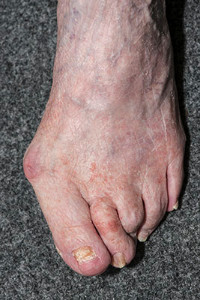 According to a surgeon on the medical staff of Lee Health, “The term bunion really implies a bump on the inside portion of the foot just behind the big toe joint.” Bunions are extremely common and some people are at a higher risk of developing them compared to others. Podiatrists say that people with flat feet are more likely to develop bunions than those with normal arches in their feet. Many podiatrists have come to the realization that bunion removal surgery isn’t very effective for those with flat feet, because the arch in the foot needs to be corrected in order to prevent more bunions from developing in the future.
According to a surgeon on the medical staff of Lee Health, “The term bunion really implies a bump on the inside portion of the foot just behind the big toe joint.” Bunions are extremely common and some people are at a higher risk of developing them compared to others. Podiatrists say that people with flat feet are more likely to develop bunions than those with normal arches in their feet. Many podiatrists have come to the realization that bunion removal surgery isn’t very effective for those with flat feet, because the arch in the foot needs to be corrected in order to prevent more bunions from developing in the future.
If you are suffering from bunions, contact Dr. Steven Shlonsky of Louisville, Kentucky. Dr. Shlonsky can provide the care you need to keep you pain-free and on your feet.
What Is a Bunion?
A bunion is formed of swollen tissue or an enlargement of boney growth, usually located at the base joint of the toe that connects to the foot. The swelling occurs due to the bones in the big toe shifting inward, which impacts the other toes of the foot. This causes the area around the base of the big toe to become inflamed and painful.
Why Do Bunions Form?
Genetics – Susceptibility to bunions are often hereditary
Stress on the feet – Poorly fitted and uncomfortable footwear that places stress on feet, such as heels, can worsen existing bunions
How Are Bunions Diagnosed?
Doctors often perform two tests – blood tests and x-rays – when trying to diagnose bunions, especially in the early stages of development. Blood tests help determine if the foot pain is being caused by something else, such as arthritis, while x-rays provide a clear picture of your bone structure to your doctor.
How Are Bunions Treated?
- Refrain from wearing heels or similar shoes that cause discomfort
- Select wider shoes that can provide more comfort and reduce pain
- Anti-inflammatory and pain management drugs
- Orthotics or foot inserts
- Surgery
If you have any questions, please feel free to contact our office located in Louisville, KY . We offer the newest diagnostic and treatment technologies for all your foot care needs.
Read more about BunionsYour Excessive Sweating Might be Hyperhidrosis
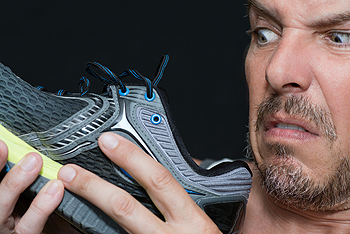 Hyperhidrosis is a disorder that is characterized by excessive sweating beyond what is considered normal. Eccrine glands, or sweat glands, are found at the soles of the feet which is why this condition tends to affect the foot area. People who suffer from hyperhidrosis are often hesitant to reach out for a treatment until their daily routines become affected by the sweat. If the excessive sweating occurs at night, it is important to seek medical assistance as it could be a side effect of a serious medical condition.
Hyperhidrosis is a disorder that is characterized by excessive sweating beyond what is considered normal. Eccrine glands, or sweat glands, are found at the soles of the feet which is why this condition tends to affect the foot area. People who suffer from hyperhidrosis are often hesitant to reach out for a treatment until their daily routines become affected by the sweat. If the excessive sweating occurs at night, it is important to seek medical assistance as it could be a side effect of a serious medical condition.
If you are suffering from hyperhidrosis contact Dr. Steven Shlonsky of Louisville, Kentucky. Dr. Shlonsky can provide the care you need to attend to all of your foot and ankle needs.
Hyperhidrosis of the Feet
Hyperhidrosis is a rare disorder that can cause people to have excessive sweating of their feet. This can usually occur all on its own without rigorous activity involved. People who suffer from hyperhidrosis may also experience sweaty palms.
Although it is said that sweating is a healthy process meant to cool down the body temperature and to maintain a proper internal temperature, hyperhidrosis may prove to be a huge hindrance on a person’s everyday life.
Plantar hyperhidrosis is considered to be the main form of hyperhidrosis. Secondary hyperhidrosis can refer to sweating that occurs in areas other than the feet or hands and armpits. Often this may be a sign of it being related to another medical condition such as menopause, hyperthyroidism and even Parkinson’s disease.
In order to alleviate this condition, it is important to see your doctor so that they may prescribe the necessary medications so that you can begin to live a normal life again. If this is left untreated, it is said that it will persist throughout an individual’s life.
A last resort approach would be surgery, but it is best to speak with your doctor to find out what may be the best treatment for you.
If you have any questions please feel free to contact our office located in Louisville, KY . We offer the newest diagnostic and treatment technologies for all your foot and ankle needs.
Working on the Feet While Pregnant
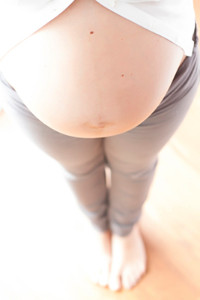 Pregnancy can create additional pressure on the feet, making certain everyday activities and responsibilities difficult for women. Women who work desk jobs should ensure that they’re sitting in chairs that offer optimal support, while women who spend a majority of their time standing should occasionally elevate their feet using a foot rest. Wearing comfortable shoes is also a must and should never be overlooked. Elevating the feet can also help pregnant women in managing edema, as the feet often swell during pregnancy.
Pregnancy can create additional pressure on the feet, making certain everyday activities and responsibilities difficult for women. Women who work desk jobs should ensure that they’re sitting in chairs that offer optimal support, while women who spend a majority of their time standing should occasionally elevate their feet using a foot rest. Wearing comfortable shoes is also a must and should never be overlooked. Elevating the feet can also help pregnant women in managing edema, as the feet often swell during pregnancy.
Pregnant women with swollen feet can be treated with a variety of different methods that are readily available. For more information about other cures for swollen feet during pregnancy, consult with Dr. Steven Shlonsky from Louisville, Kentucky. Dr. Shlonsky will attend to all of your foot and ankle needs.
What Foot Problems Can Arise During Pregnancy?
One problem that can occur is overpronation, which occurs when the arch of the foot flattens and tends to roll inward. This can cause pain and discomfort in your heels while you’re walking or even just standing up, trying to support your baby.
Another problem is edema, or swelling in the extremities. This often affects the feet during pregnancy but tends to occur in the later stages.
How Can I Keep My Feet Healthy During Pregnancy?
- Wearing orthotics can provide extra support for the feet and help distribute weight evenly
- Minimize the amount of time spent walking barefoot
- Wear shoes with good arch support
- Wear shoes that allow for good circulation to the feet
- Elevate feet if you experience swelling
- Massage your feet
- Get regular, light exercise, such as walking, to promote blood circulation to the feet
If you have any questions please feel free to contact our office located in Louisville, KY . We offer the newest diagnostic and treatment technologies for all your foot and ankle needs.
Foot Concerns for People of a Certain Age
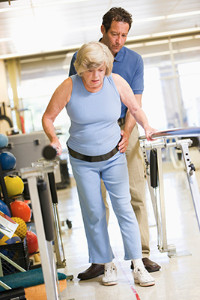 Foot diseases and other foot-related problems often become more prevalent as we age. Years of bearing body weight and certain ailments can combine to wreak havoc on the feet and ankles. The foot problems we may experience as time goes on vary from minor to potentially very serious. First and foremost, if you are a diabetic, foot care needs to be a high priority. Diabetic ulcers and sores, if left untreated, can lead to infection and even gangrene, resulting in amputation. Daily foot inspections are necessary to ensure that there are no cuts, sores, or swelling. Even something as seemingly minor as cracked skin on the foot can lead to terrible consequences if gone unnoticed. Using moisturizer and soap that doesn’t dry out the skin can help in this area. That being said, it is also important to keep the feet dry, as toenail fungus grows more readily in moist environments. Keeping the feet elevated is also a good tip. This will help circulate the blood to the lower extremities. Poor circulation can lead to serious medical conditions.
Foot diseases and other foot-related problems often become more prevalent as we age. Years of bearing body weight and certain ailments can combine to wreak havoc on the feet and ankles. The foot problems we may experience as time goes on vary from minor to potentially very serious. First and foremost, if you are a diabetic, foot care needs to be a high priority. Diabetic ulcers and sores, if left untreated, can lead to infection and even gangrene, resulting in amputation. Daily foot inspections are necessary to ensure that there are no cuts, sores, or swelling. Even something as seemingly minor as cracked skin on the foot can lead to terrible consequences if gone unnoticed. Using moisturizer and soap that doesn’t dry out the skin can help in this area. That being said, it is also important to keep the feet dry, as toenail fungus grows more readily in moist environments. Keeping the feet elevated is also a good tip. This will help circulate the blood to the lower extremities. Poor circulation can lead to serious medical conditions.
If you need your feet checked, contact Dr. Steven Shlonsky of Louisville, Kentucky. Dr. Shlonsky will attend to all of your foot and ankle needs and provide you with quality treatment.
Geriatrics and Podiatry
When people age, some common issues that may occur are bone density loss, dry skin, poor circulation, and rough brittle nails. These issues may also affect your foot health if the necessary steps are not taken to alleviate the problems.
It is important to take care of your feet because feet that are injured or diseased can affect your overall health. Having painful feet hinders your ability to do daily activities or may decrease your willingness to do the things that you need to do.
Visiting Your Geriatrician
As we age, health problems become more likely, so it is essential to visit your doctor for check-ups to ensure that you are doing the best you can to take care of your health. It is recommended to check your feet frequently for any possible cuts, bruises, swelling, corns or any other irregularities.
Taking Care of Elderly Feet
Cracked or dry feet can be treated by applying moisturizer often. It is also important not to wear old socks because the older the sock is, the higher the possibility there will be that there is bacteria there. Wear fresh socks and make sure they fit properly.
Proper foot health means that you can have a more active lifestyle and you will not be bogged down by pain. Foot health also leads to good circulation, which is paramount for overall health.
If you have any questions, please feel free to contact our office located in Louisville, KY . We offer the newest diagnostic tools and technology to treat your foot and ankle needs.
Michigan Tech celebrates National Biomechanics Day
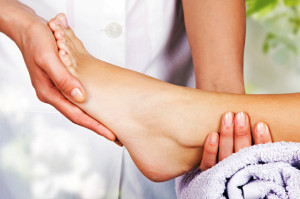 This year Michigan Technological University participated in National Biomechanics Day on April 6th, a world-wide event for educators and students to advance the education of human biomechanics. The Kinesiology and Integrative Physiology Department of the university collaborated with multiple departments across campus and invited local students to participate in hands-on activities focused on biomechanics research. Among these activities, members of the faculty demonstrated various tools used to analyze and describe human motion during exercise. Students were also given the chance to test their strength compared to Michigan Tech football players and to make imprints of their feet, allowing them to analyze how different foot types impact movements across multiple joints.
This year Michigan Technological University participated in National Biomechanics Day on April 6th, a world-wide event for educators and students to advance the education of human biomechanics. The Kinesiology and Integrative Physiology Department of the university collaborated with multiple departments across campus and invited local students to participate in hands-on activities focused on biomechanics research. Among these activities, members of the faculty demonstrated various tools used to analyze and describe human motion during exercise. Students were also given the chance to test their strength compared to Michigan Tech football players and to make imprints of their feet, allowing them to analyze how different foot types impact movements across multiple joints.
If you have any concerns about your feet, contact Dr. Steven Shlonsky from Louisville, Kentucky. Dr. Shlonsky can provide the care you need to keep you pain-free and on your feet.
Biomechanics in Podiatry
Podiatric biomechanics is a particular sector of specialty podiatry with licensed practitioners who are trained to diagnose and treat conditions affecting the foot, ankle and lower leg. Biomechanics deals with the forces that act against the body, causing an interference with the biological structures. It focuses on the movement of the ankle, the foot and the forces that interact with them.
A History of Biomechanics
- Biomechanics dates back to the BC era in Egypt where evidence of professional foot care has been recorded.
- In 1974, biomechanics gained a higher profile from the studies of Merton Root, who claimed that by changing or controlling the forces between the ankle and the foot, corrections or conditions could be implemented to gain strength and coordination in the area.
Modern technological improvements are based on past theories and therapeutic processes that provide a better understanding of podiatric concepts for biomechanics. Computers can provide accurate information about the forces and patterns of the feet and lower legs.
Understanding biomechanics of the feet can help improve and eliminate pain, stopping further stress to the foot.
If you have any questions please feel free to contact our office located in Louisville, KY . We offer the newest diagnostic and treatment technologies for all your foot and ankle needs.
Read more about The Importance of Biomechanics in Podiatry






